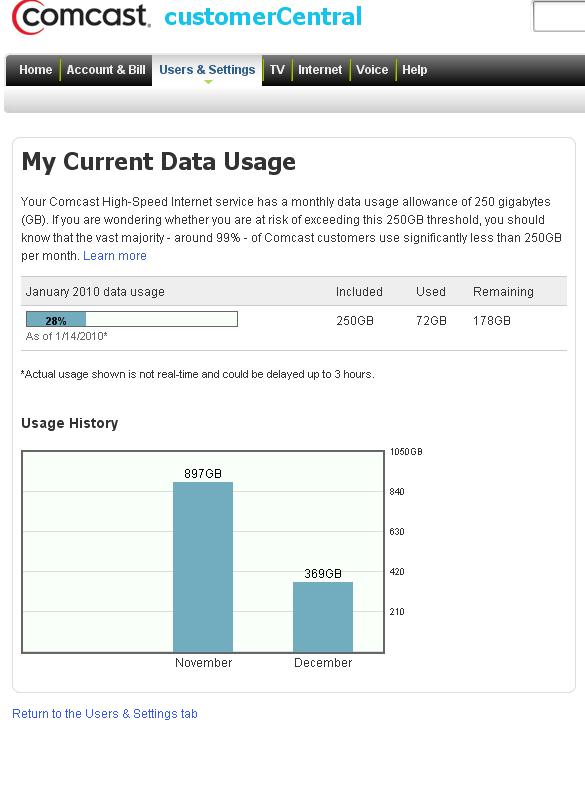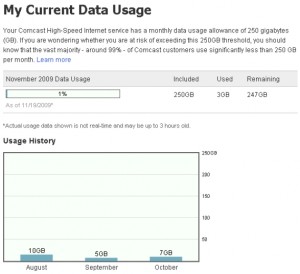![]() Broadband Reports noticed Comcast’s usage meter has broken out of its limited trial in Portland, Oregon and customers are receiving notices across the Pacific Northwest noting the company’s usage meter is now available for their ‘convenience.’ But remarkably, Comcast has told 99 percent of their customers they “do not need to check the usage meter” because they won’t be close to the company’s 250GB limit:
Broadband Reports noticed Comcast’s usage meter has broken out of its limited trial in Portland, Oregon and customers are receiving notices across the Pacific Northwest noting the company’s usage meter is now available for their ‘convenience.’ But remarkably, Comcast has told 99 percent of their customers they “do not need to check the usage meter” because they won’t be close to the company’s 250GB limit:
We are pleased to announce the pilot launch of the Comcast Usage Meter in your area. This new feature is available to Comcast High-Speed Internet customers and provides an easy way to check total monthly household high-speed Internet data usage at any time. Monthly data usage is the amount of data, such as images, movies, photos, videos, and other files that customers send, receive, download or upload each month.
Comcast measures total data usage and does not monitor specific customer activities to determine data usage. The current data usage allowance for the Comcast High-Speed Internet service is 250GB per month. This means that the vast majority of our customers – around 99% currently – will not come close to using 250GB of data in a month, and do not need to check the usage meter.
That leads to two questions: Why would a company make an effort to produce a meter that is irrelevant to the vast majority of customers, and why institute a usage cap at all if only one percent of customers come close to exceeding it?
The answer, of course, is that most customers won’t need to worry about the limit today, but tomorrow is another matter.
As more broadband users begin watching video over Comcast’s broadband service, they will come perilously closer to the fixed limit Comcast offers — a limit that protects Comcast’s cable television package from customers switching to broadband-based viewing.

Bandwidth Hog? One customer consumed 897GB last November... using a backup method Comcast itself recommends to customers
Once Internet Overcharging schemes get their foot in your door, it’s usually only a matter of time before they force their way in and start looking for your checkbook.
Would Comcast seek to eventually lower today’s 250GB limit? Perhaps, but there is no evidence of anything imminent. It has been done before in Canada and sold as a “money-saver,” offered with an “insurance policy” Bell had the chutzpah to suggest “protected” customers from overlimit fees. Monetizing broadband use is a hot topic for providers seeking enhanced revenue from their broadband divisions. Time Warner Cable tried to convince customers it would tie revenue earned from its own Internet Overcharging experiment into expansion of their local broadband networks. That was proven blatantly false when upgrades commenced in areas never part of “the experiment,” while those that were have been bypassed for DOCSIS 3 upgrades.
Some might believe such limits protect providers from dreaded hordes of malicious “bandwidth abusers,” a broadband urban legend comparable to the Cadillac-driving welfare queens we heard about in the 1980s. In truth, the handful of so-called “abusers” have quietly been dealt with under the terms of existing Acceptable Use Policies for years without inconveniencing the vast majority of customers with arbitrary usage limits. But the industry-sponsored narrative persists, usually in the form of some neighborhood hacking teenager sucking your bandwidth dry and costing you money.
What constitutes “excessive” or “fair” use ludicrously ranges from Frontier’s infamous 5GB usage allowance to Comcast’s 250GB limit. Every company insists their limit is the fairest and that 99 percent of customers won’t exceed it, no matter what it is.
Are there consumers moving a lot of data across Comcast’s network? Yes. One Broadband Reports reader in Spokane posted a usage report showing a whopping 897GB of consumption in November. Was he running a torrent client swapping an illicit copy of Avatar with people all over the world? Was he downloading lots of illegally obtained music and movies? Was he running a commercial business on a residential connection? No. It turns out he was retrieving a backup to restore data from a failed hard drive. In fact, Comcast recommends customers use online backup services, and even provides customers with a free, limited version of Mozy, which includes an easy path to upgrade to much larger storage plans.
Even Comcast doesn’t believe in the usage-limits-solve-congestion meme. In response to a query from IP Democracy back in February, 2008:
“Most [ISPs] recognize that a metered approach doesn’t solve peak-hour usage pressures.”
But it will do wonders for a provider’s bottom line.


 Subscribe
Subscribe

Am I a bandwidth hog for getting my monies worth off of an unlimited plan? No, I am merely getting my monies worth out of it. Obviously the company that sold it to me thought it was a fair deal or else they would of changed it a long time ago to fit them. How is a bandwidth “hog” defined? By the company that doesn’t like you getting your monies worth out of the plan? I don’t think so. If it was impacting others on the network I could understand the “hog” but I have yet to have my connection… Read more »
Hare to say it, but the reason cable rate are getting higher is because people will bear the price increases. Cord cutters lower prices. Or potential ones anyway. As for blowing the cap out of the water, doing so for everyone on the cable node would result in slow internet speeds. Fortunately there are enough light users (who would never get near 250GB) are on the average node that this isn’t a problem. Also, Comcast has not made any noise about lowering caps or charging overages. That’s what business plans are for. They aren’t much more expensive (maybe $25-$30, unless… Read more »
“Hare to say it, but the reason cable rate are getting higher is because people will bear the price increases. Cord cutters lower prices. Or potential ones anyway.”
BINGO!! I tried pointing this out back a few articles ago with the FoodNetwork stuff. People were chiming in saying, “I can’t live without my FoodNetwork!”. Well the networks love hearing that. Why shouldn’t they raise prices when you will pay no matter what just to get your “fix”?
Comcast disconnected our household on Tuesday. Apparently we used 980GB in December. There are seven college kids in my house. While I tried to manage the bandwidth usage, it’s impossible. I even offered to pay additional fees, which they rejected. I’ve had my service terminated for a year and, due to lack of alternatives, have had to go back to 7Mbps DSL from our 16Mbps cable. If that’s the way they wish to conduct business, that’s fine. After offering them more money and being refused, I proceeded to terminate all of my comcast services. Demand that they remove the cable… Read more »
Charming. I’m hardly surprised as Time Warner Cable “Security” has been known to do the same thing — cut service first and let the customer ask questions later… until someone finally refers them to security for a usage spanking. Their meter is not widespread… yet, which is why you probably didn’t see it. In the past, other customers in your situation established multiple Comcast accounts to divide up usage. Some areas didn’t even question it, others wanted an explanation for why multiple connections were needed. College students usually worked, although others cooked up “apartments” or boarding house excuses to pass… Read more »
Comcast’s online bandwidth usage meter is broken! The online bandwidth usage meter was rolled out to us late February in Minnesota. The first few days after they sent an email out saying it was launched the meter didn’t show up on their site. After a couple of days it showed up. However, it said we were using 0 GB. The graph show 0 GB until March 1st. Then each day it grew and grew by 5-10 GB a day. The graph today March 5th 2010 says February’s usage history of 36GB. I could almost believe this one. But, the current… Read more »
Eh why should Comcast contact you? They’re not babysitters you know! Do you call them when your car doesn’t start as well?
Mine is flat out BROKE and they refuse to believe me! Apparently, me and only ONE other person used 1062 GB in single month. We download no music, don’t watch streaming videos more than they said was ok and only download around 8-10 movies per month. Yet, we went past the limit by a hell of a lot. Not only that, but once I started montoring the supposedly accurate meter, I noticed it went up by 5 whole gigabytes in a day, when niether of even used it! What the hell I am supposed to do to stop the stupid… Read more »